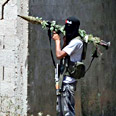
Hamas gunman in Gaza
צילום: איי פי
The price of restraint
Israeli indecision in face of rocket attacks emboldens Hamas, guarantees escalation
Vague, non-aggressive, and mostly inconsistent Israeli policy – this is the recipe for the ongoing failure on the Gaza front.
The political leadership does not want to reoccupy the Strip, the army is not overly excited about returning to the Gaza quagmire, top political and military officials know exactly what we should not be doing, yet nobody wishes to take any risks – either diplomatic or military – in order to put out the fire. So what do we do? They have no idea.
Meanwhile, they engage in experiments, utilize economic, psychological, and military levers, play with fire, and pretend that it would be possible to control the height of the flames over time.
The unwritten instructions to the army are to kill, but not too much. The IDF needs to act in a way that hurts and deters Hamas, but does not obligate it to resort to heavy fire on Gaza-region communities, but rather, make do with two or three Qassams a day. We can live with that.
A month and a half ago, the Egoz unit operated against mortar cells in the Strip. The unit was very successful. Too successful. A total of 18 Hamas men were killed there, including the son of senior Hamas figure Mahmoud al-Zahar. Hamas was mad, and for the next three days, about 200 rockets were fired at Gaza-region communities.
Israel’s political leadership was quite dissatisfied with the Southern Command’s excessive success. The soldiers killed too many Palestinians in that raid, and the Southern Command was gently reprimanded for deviating from expectations.
On Wednesday, the Air Force and Shin Bet eliminated several men who returned from military studies in Iran and were about to carry out a terror attack. Hamas was infuriated. In their view, we breached the rules of the game – after all, Hamas determines the height of the flames, not Israel.
And indeed, in response to the surgical strike, close to 50 rockets were fired at southern communities. A student at the Sapir College was killed by a direct hit. Factory workers in Sderot survived miraculously. And for the first time, a four-rocket barrage landed in Ashkelon – no longer a single rocket meant as a signal. Yesterday, Ashkelon became yet another routine target for Hamas, just like Sderot.
Hamas becoming bolder, more aggressive
Is it possible that fears of an aggressive Hamas response would lead to Israeli hesitation to target “ticking bombs” or armed terrorists next time? Hamas not only expanded its range, but also the frequency of the fighting. If in the past it was only willing to take a risk and respond in kind once every few months, by now it produces heavy barrages every few weeks, while its rockets become more accurate and deadlier.
It is unthinkable that after Hamas’ Wednesday assault, the group’s leadership still faces no threat to its life. Hamas’ military and political infrastructure should be dealt with non-stop. This is a phase that we can enter even before we embark on the “large-scale ground operation” that nobody in Israel is interested in at this time. Yet the political leadership is so scared of escalation that it hinders the shift to this interim phase – just so we don’t give Hamas a pretext to lose it.
The problem is that, paradoxically, this hesitation actually guarantees that we shall be faced with a large-scale incursion more quickly – because Hamas leaders got the idea. They understand that Israel’s strategy starts and ends with “controlling the heights of the flames.” This Israeli restraint is perceived by Hamas as indecision. When the threats on their lives start and end in the newspaper, they no longer take threats seriously.
Hamas’ response to IDF operations will become increasingly bolder and more aggressive, more Israelis will be killed and wounded, the public pressure will grow, and we shall find ourselves – because of twisted policy, embroiled in a war we didn’t want at the least convenient timing.










